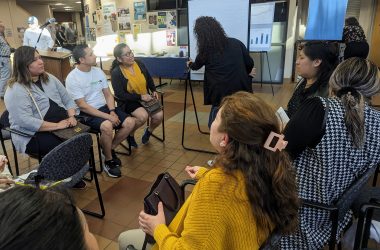At any hour of the day, Hank Crapser may get a call from a cop asking him to go meet someone on the street who needs help.
The alternative, often, is a stay in jail or a criminal charge.
Crapser is a navigator for Marion County’s Law Enforcement Assisted Diversion Program, created in 2018 to help keep people who are homeless, have addictions or serious health problems from cycling in and out of jail or the emergency room, without their underlying problems being addressed.
Four years after its inception, program data shows more than half of the 205 people referred to LEAD enrolled. Most of those who continued participating went on to get a job, find a place to live and stay clean from drugs.
The team works with people who commit low-level crimes or have had previous encounters with police to refer them to social services they need.
Often that process starts curbside, or in the back of a cop car.
Officers in Marion County call the LEAD team when they have contact with a person who they suspect might have underlying issues like homelessness or addiction and is willing to participate.
At any time of day, a navigator will meet the person where they are, take note of basic information like demographics and schedule an assessment.
Of the 205 people referred since the program’s inception in 2018, two in three went on to meet with their navigator and complete an assessment within seven days as required, according to program data as of Aug. 23.
The assessment covers how often someone is using drugs, mental health, financial status, where they are living, any disabilities and benefits they may qualify for. It also includes whether they know how to search for a job, how confident they are in the interview process and whether they think a previous employer would give a positive recommendation.
That’s intended to get a snapshot of the person at the start of the program, address any immediate needs — such as getting them a phone to stay in contact with their navigator — and plan for their long-term needs.
The LEAD team consists of program coordinator Josh Wolf, program Sgt. Jason Bernards and two navigators.
LEAD has navigators on shift from 8 a.m. to 5 p.m. Monday through Friday, but there is an on-call navigator who can respond 24/7 “if the need should arise,” Wolf said.
The program only serves people accused of crimes caused by underlying issues such as homelessness or substance abuse. That could include minor theft, trespassing or disorderly conduct. Crimes against people such as assault, sexual assault or domestic violence don’t qualify.
The crimes also can’t involve a victim who is expecting payment in damages, said Sgt. Jeremy Landers, sheriff’s office spokesman.
Sobriety isn’t required to get help through the program.
“Quite frankly, that doesn’t work,” Wolf said. Instead, navigators try to help those enrolled reduce the amount and frequency they’re using.
“Harm reduction does not mean abstinence, it means accepting individuals are probably going to continue use, but encouraging them to get treatment,” he said.
Referrals also don’t need to stem from a crime.
“It could be just that we go out into one of the camps and we find an individual who’s had a lot of contact with law enforcement in the past,” he said. “Since they’ve had those contacts, why not do something preventative as opposed to wait for the other shoe to drop?”
Social referrals, where no crime is involved, also have more leeway about whether someone can get into the program.
For referrals arising out of an arrest, the Marion County district attorney must agree not to seek charges while the person works through the program. If they don’t meet with their navigator in seven days, Wolf said, “the person winds up going back through the system again.”
Community organizations can also refer people to LEAD.
Since the program’s inception, 57 people have remained enrolled long enough to complete a follow-up assessment showing their progress at six months.
Of those, 16% (nine people) were housed before enrolling in the program, while 66% (37.6 people) after at least six months of active participation in the program.
The percentage of people employed grew from 23% pre-LEAD to 53%.
The percentage reporting any illicit drug use in the last 30 days declined from 91% to 50%.
Wolf said referrals to LEAD have been consistent since the program’s inception — about two or three per month.
“Catching these guys at a moment where they’re actually willing to get help is a huge asset that the navigators have,” Wolf said.
That’s in large part because the navigators have also struggled with substance abuse and addiction in the past.
“I have multiple clients that have (been) three years clean and sober, that have their lives back, jobs, they have houses, they have their kids back,” Crapser said.
Three of them went on to work for the program, one a certified drug and alcohol counselor and two mentors.
“Having the lived experience is an absolutely crucial part of being able to understand where these guys are coming from,” Wolf said. “You need to have the substance history in order to become a certified recovery mentor or a certified alcohol and drug counselor. You literally can’t have the job without it.”
Landers said the program is intended to help change the dynamic of how people encounter law enforcement, because they may have rapport with a navigator but not police.
For same-day treatment, a navigator can also go with people to Ideal Options, a clinic that gives people prescriptions for medication to help them transition off illegal drugs and uses treatment protocols that minimize the time people have to spend in withdrawal. The clinic expanded to Salem in April 2020.
“Getting people treatment as soon as you can is absolutely vital to the success of the program,” Wolf said. “Not just this program, every program, because people are dying.”
Seven local law enforcement agencies participate in the program. About half of referrals have come from the Marion County Sheriff’s Office and about a third from Salem Police Department. Other participating agencies include police in Silverton, Keizer and Woodburn.
Participating agencies receive training from Wolf, a law enforcement member and a navigator. Wolf said one of his biggest priorities is getting back to training officers in LEAD.
“Ever since Covid everything’s been by wayside, training-wise,” Wolf said. “We’re getting everything spun up again.”
Previously part of the county’s Health and Human Services Department, the program was transferred to the Marion County Sheriff’s Office on June 1.
The biggest change will be how funding is approved and tracked, Wolf said, as the supervisor who previously did that work was running about five other programs at the same time.
Landers said the move is intended to facilitate more direct communication between navigators and law enforcement.
According to program data, there are 57 active LEAD clients despite having a capacity of 44. “That’s why we’re hiring,” Wolf said.
The program has one Spanish-speaking navigator, a Health and Human Services Department employee, who works with the program only about 20% of the time.
Wolf said that’s one of the program’s limitations, and the county is looking to hire a full-time navigator who speaks Spanish.
“One of the things that’ll be key to growth for the program is to continue to recruit people who are absolutely service-oriented and truly motivated to help the community,” Landers said. “Really the biggest challenge is to continue to find those people who really want to help these folks.”
Contact reporter Ardeshir Tabrizian: [email protected] or 503-929-3053.
JUST THE FACTS, FOR SALEM – We report on your community with care and depth, fairness and accuracy. Get local news that matters to you. Subscribe to Salem Reporter starting at $5 a month. Click I want to subscribe!

Ardeshir Tabrizian has covered criminal justice and housing for Salem Reporter since September 2021. As an Oregon native, his award-winning watchdog journalism has traversed the state. He has done reporting for The Oregonian, Eugene Weekly and Malheur Enterprise.









